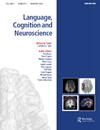感人的思想:情境依赖型具身模拟视角下的情感概念
IF 1.8
3区 医学
Q2 AUDIOLOGY & SPEECH-LANGUAGE PATHOLOGY
引用次数: 1
摘要
本文章由计算机程序翻译,如有差异,请以英文原文为准。
Moving thoughts: emotion concepts from the perspective of context dependent embodied simulation
ABSTRACT This review article presents our perspective on psychological and physiological mechanisms underlying concepts from the domain of affect, emotion, and motivation. We suggest that these concepts are linked to sensorimotor and interoceptive systems, and as such represent a paradigmatic example of embodied conceptual processing. In view of recent debates about the scope of embodiment, however, we argue that the use of grounded resources in emotion concepts is flexible and context dependent. The degree to which embodied resources are engaged during conceptual processing depends upon multiple factors, including an individual's task, goals, resources, as well as constraints both temporal and situational. In addition, we highlight the extent to which conceptual understanding of emotion, and its specific embodiment, is shaped by social and cultural influences. Accordingly, we call for research that more fully incorporates higher-order psychological factors into the study of the physiological and neural mechanisms that underpin emotion concepts.
求助全文
通过发布文献求助,成功后即可免费获取论文全文。
去求助
来源期刊

Language Cognition and Neuroscience
AUDIOLOGY & SPEECH-LANGUAGE PATHOLOGY-BEHAVIORAL SCIENCES
CiteScore
4.50
自引率
13.00%
发文量
70
期刊介绍:
Language, Cognition and Neuroscience (formerly titled Language and Cognitive Processes) publishes high-quality papers taking an interdisciplinary approach to the study of brain and language, and promotes studies that integrate cognitive theoretical accounts of language and its neural bases. We publish both high quality, theoretically-motivated cognitive behavioural studies of language function, and papers which integrate cognitive theoretical accounts of language with its neurobiological foundations.
The study of language function from a cognitive neuroscience perspective has attracted intensive research interest over the last 20 years, and the development of neuroscience methodologies has significantly broadened the empirical scope of all language research. Both hemodynamic imaging and electrophysiological approaches provide new perspectives on the representation and processing of language, and place important constraints on the development of theoretical accounts of language function and its neurobiological context.
 求助内容:
求助内容: 应助结果提醒方式:
应助结果提醒方式:


